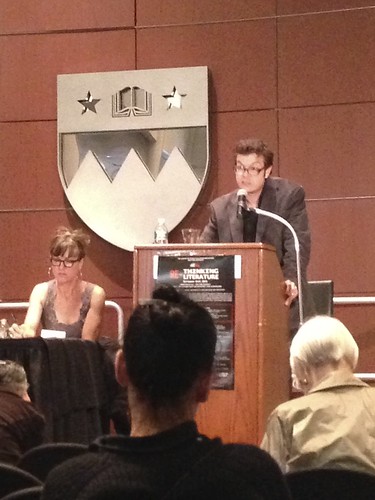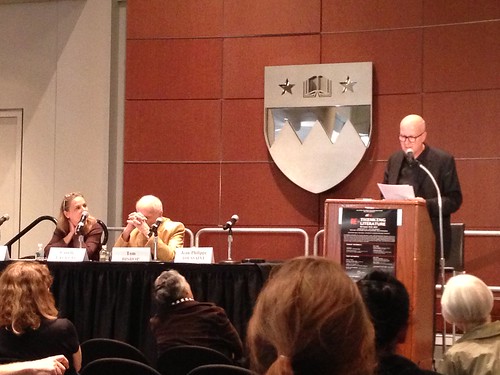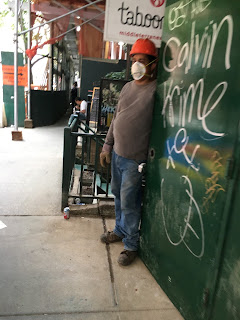As part of my preparatory remarks before my reading at
Naropa University, I noted a "horrible" conference I'd attended only a week before. I also invoked the same event during my comments at the
&Now Festival at the
University of Colorado. In both cases I mentioned only that the conference took place at
New York University. I didn't elaborate, but that's in part what a blog is for, isn't it? The international conference I was referring to at both events was
"Re-Thinking Literature," and it ran from September 19th through the 21st this fall.
Oxford (New College) faculty member
Donatien Grau and
NYU professor
Tom Bishop were the organizers, and nearly 20 writers, critics, scholars, academicians, and theorists spoke over the three-day gathering.
So what was my beef? You probably know what's coming. In three days of pontificating about "literature," the conference featured not a single author, scholar or theorist of color, from the US or overseas, on a single panel, nor did a single panel or panelist, as far as I could tell,
directly address or discuss literature by non-Europeans or non-Euro-Americans. Not one. Why? I don't know. It was not as if this French-slanted conference, one of whose organizers is a professor in NYU's French department, had no colleagues who could conceivably participate. The esteemed writer and critic
Assia Djébar was, until a few years ago, a professor of French at NYU, as was the historian
Sylviane Diouf, and among the NYU French department's current faculty there is
J. Michael Dash, a major scholar of
Francophone Caribbean literature, with
Manthia Diawara, the scholar, critic, film-maker, and former head of NYU's
Africana Studies department an affiliate. And that's
just NYU's
French department. (I can't speak about Oxford's faculty.) Perhaps he asked all of them, or one of the (m)any other faculty members of color working in and around literary studies in (m)any of NYU's other departments, whether they wanted to participate, and perhaps they all said no. Perhaps they
all were busy.
 |
| Shelley Jackson (l) and Ben Lerner at the podium |
But say they were not. One might then argue that the organizers intended that the conference, which included papers and conversations on a range of topics, including the relationships between literature and:
art criticism and
installations;
religion; affect;
cognition; and
textualities, to name just a few of the topics, be primarily about what
they saw as
literature, which is to say, mostly
European and
Euro-American literature, unmarked by anything beyond and occupying nothing not somehow captured by the unnamed, unacknowledged and unacknowledgeable signifier of whiteness. I mean, it stands to reason that when one says the word "literature," a Platonic abstraction, one means only, can only mean, the literature of Europe and (some parts of) European America, no? Yes? So be it. But then why not just call the conference "Re-Thinking Euro-American Literature" or "Re-thinking Elite/High Literature by White People" or something similar, since the organizers made it clear that the vast corpus of literatures by everyone else across the world did and does not matter? There is privilege, there is entitlement, there is blindness, there is arrogance, and there is the expectation that because you have told yourself and others for centuries that you--or certain ones of you--are all that matter, that's all that's supposed to matter.
I should add that after a day of this stuff--and a report, by a friend, who attended and was aghast at the rambling mess served up by the conference's opening night speakers--I had had enough of what I have encountered for much of my adult life. I left them to their intellectually and hermetically sealed white room. It very well could have been the case on the final day, which I did not attend, that, even if all the speakers--and I should be clear that I do respect and admire the work of many of the participants--were white, perhaps one or several of them did look and speak past the self-constructed wall of Euro-American literary comfort, to acknowledge that there was and is quite a bit of other very vibrant work, in literature, literary and cultural criticism, philosophy, translation, etc., out there not centered on or produced by Europeans and Euro-Americans. If so, great for them.
I do wonder if any of them asked themselves why there were only white people on the panels. Did anyone verbalize this to Grau or Bishop? Did they see this as a problem and even
mention it to each other? The audience certainly was not only white. If no one did ask such a question, I do wonder, what would lead them even to the threshold of doing so of their own accord? At any rate, my adult experience has been and continues to be that when it comes to the literary and the academic literary world, this sort of thing, a kind of
de facto aesthetic and critical
apartheid is still too prevalent. Sometimes there are one or two tokens, or a panel in which all the people of color are bunched up together and only expected to talk about certain expected things. It's this way still in various pockets of American society, including popular culture. And in any case, as I noted about the "Re-thinking Poetics" conference at
Columbia University a few years back, it represents a particularly perverse irony in a city like
New York, the most diverse in the United States. Some "re-thinking" really does need to occur, but it's not just about literature.
That said, I did hear one talk I found quite intriguing, by
Ben Lerner, whom I approached afterwards and briefly chatted with. I specifically noted the conference's whiteout cast to him, and he agreed it was not good. (I did not expect him, as an invitee and panelist, however, to say anything to Grau or Bishop, but perhaps he did.) Ben's paper was titled "Virtual Ekphrasis: Fiction as Criticism and Curation," and explored the idea of the novel--as opposed to poetry, a genre in which he has distinguished himself--as a curatorial site, a space "in which you can embed other artworks," and a "testing ground for aesthetic experience." An introduction of sorts both to his first novel,
To the Atocha Station, and his forthcoming one, his talk was full of insights, but it circled around the key point that in "speculative" fiction, and not just in the commonly understood science fictional sense, you could write about "artworks not yet realized" or, to go further, that were and are "unrealizable."
As one example from the canon, he cited
Henry James's famous story "A Madonna of the Future," a narrative about an artist producing a blank canvas (and which I thought of as I assigned
John Ashbery's famous sestina "The Painter" as part of my fall undergraduate class's poetry component). This James story is often thought to dramatize the tyranny of artistic influence and resulting failure. In
Arthur Danto's reading of the story, however, the philosopher and critic views James's character's Theobald's artistic production or lack thereof as a masterpiece, and a curator version attempts to convince the artist that his work is a harbinger of later artists like
Robert Ryman, Alexander Rodchenko, Kasimir Malevich, and
Robert Rauschenberg, and that what appears as failure in one age harbors potentiality for the future.
Ben linked this concept to contemporary novels written in the current moment of the "postmedium," which is to say, after the stability of particular
media as we've known them, and also to our current aesthetic and social ontologies, where the status between art and life often blurs. He identified
Rachel Kushner's
National Book Award-nominated novel
The Flamethrowers as exemplary in exploring this unstable status. In Kushner's novel the main character, Reno, is deeply interested in the artist
Tony Smith and his idea of abandoning art in favor of situationism, experience. Kushner describes Reno's experience of temporality at times as a "trace of a trace of a trace," but Lerner was especially interested in the novel's depiction of her attempts to collapse art into life, and the links with 1970s art and earlier precursors, including
Italian futurism and industrial design, via the figure of
T. P. Valera, and the Valera bike--which occasioned, though Ben didn't discuss this, a prickly review from motorcycle enthusiast
Frederick Seidel--which entailed entangling and collapsing art into life. Kushner, he said, organizes her novel around the dream of dissolving the line between art and life. Unlike recent works by
Sheila Heti or
Tao Lin, however, it doesn't stylistically or generically collapse the distinctions but virtualizes them.
As part of the Q&A portion, I asked Ben a question about the limits of liberal discourse, particularly in the face of incommensurable, globalizing alterities and competing rationalities--ideas I've been writing through a bit myself in my current fictional projects and thinking about after reading some of
David Palumbo-Liu's critical work--and the novel's capacity to address and possibly resolve this crisis. He responded thoughtfully by talking about the relationship between novels and politics, though he did not really answer whether the contemporary American realist novel, so favored by the publishing industry and American literary culture-makers, could do what Palumbo-Liu has argued certain works, by writers such as
J. M. Coetzee and
Ruth Ozeki, have managed to. His talk nevertheless really got me thinking about questions of representation and futurity, the imagination and the possibilities or impossibilities--challenges--of depicting the possible, in art, and that, I guess, does entail "re-thinking literature," which ultimately did make attending the conference, for all its limitations, worthwhile.
 |
| Camille Laurens (l), Tom Bishop (center), and Jean-Pierre Toussaint (at podium) |



































